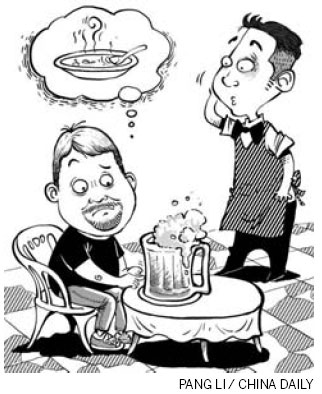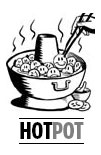Bottled up anxiety about the fear of warm beer
By Stuart Beaton ( China Daily ) Updated: 2010-08-24 10:40:34
My first week in China was spent wondering if there really was refrigeration in The Middle Kingdom.
I was shunted from place to place, and offered a beer. This was, inevitably, room temperature or warmer.
By the end of that week, I was quoting Barry McKenzie - "I could use an ice cold tube of the amber infusion!"
For those of you not au fait with the Aussie lingo, that means, "I'd like a can of beer out of the fridge."
I was absolutely at my wits' end. I love a Tsingtao or two, but it's got to be a cold beer, or it's just not nice.
Beer isn't just a drink. It's a living creature.
A good brewer will mix his ingredients, and monitor it closely from start to finish - and that means when it's in your glass. So he's looking for the best possible result.

OK, hands up if you know how to make mantou, or steamed bread. Right, so you know that you have to make a mixture that involves yeast, water and flour.
Well, if you can make mantou, you should be able to make beer. In fact, China can lay claim to some of the best beers in the world - if they're served correctly.
Beer, if you're Australian, is the staff of life - we call it "liquid bread". Actually, we call it a lot of names - "amber fluid", "singing syrup", "coopers' finest", and "XXXX", just to name a few.
A master brewer will take his raw ingredients, think about their use and produce a brew so good that your tastebuds will sing its praises.
But they aim for a brew that tastes best at a certain temperature - cold. Very cold.
When I first came to China, I was shocked at just how warm beer was served. At one mixer for staff at the school I was assigned to teach at, it was being plucked out of tubs of warm water.
That's not beer, folks: That's barley soup!
I know that in China, liquids are served hot. It's an idea that's been handed down for centuries, and there's absolutely nothing I can say or do that will persuade people to do things any other way.
However, that's not going to stop me from trying.
Regular readers should know by now that I'm passionate about food. If you're going to eat or drink something, you should make it the best you can.
So the emphasis must be placed not only on the ingredients but also on the experience of the food or drink as a whole. That means serving things at the right temperature, in the right glassware.
Don't slop your beer in to random cups and bowls - invest in some nice, tapered glasses. They'll let you pour it so that it tastes best, and isn't just a mass of suds.
Store your beer in a fridge. I'm so keen on cold beer that in winter in Tianjin, I store my beer in the cage outside the window - although you need to keep an eye on it, lest it freezes and explodes in the bottle.
Cold beer should be as crisp as a new season's apple - and as refreshing as the first sip at a spring after a long desert journey.
You shouldn't have to struggle with that warm, watery taste. It should just glide down your throat like it wasn't even trying.
So the next time someone asks you if you'd like a beer, tell them yes. But make sure you tell them to make it a cold one.
|
|
|
|
|
|
|
|


























 Raymond Zhou:
Raymond Zhou: Pauline D Loh:
Pauline D Loh: Hot Pot
Hot Pot Eco China
Eco China China Dream
China Dream China Face
China Face






